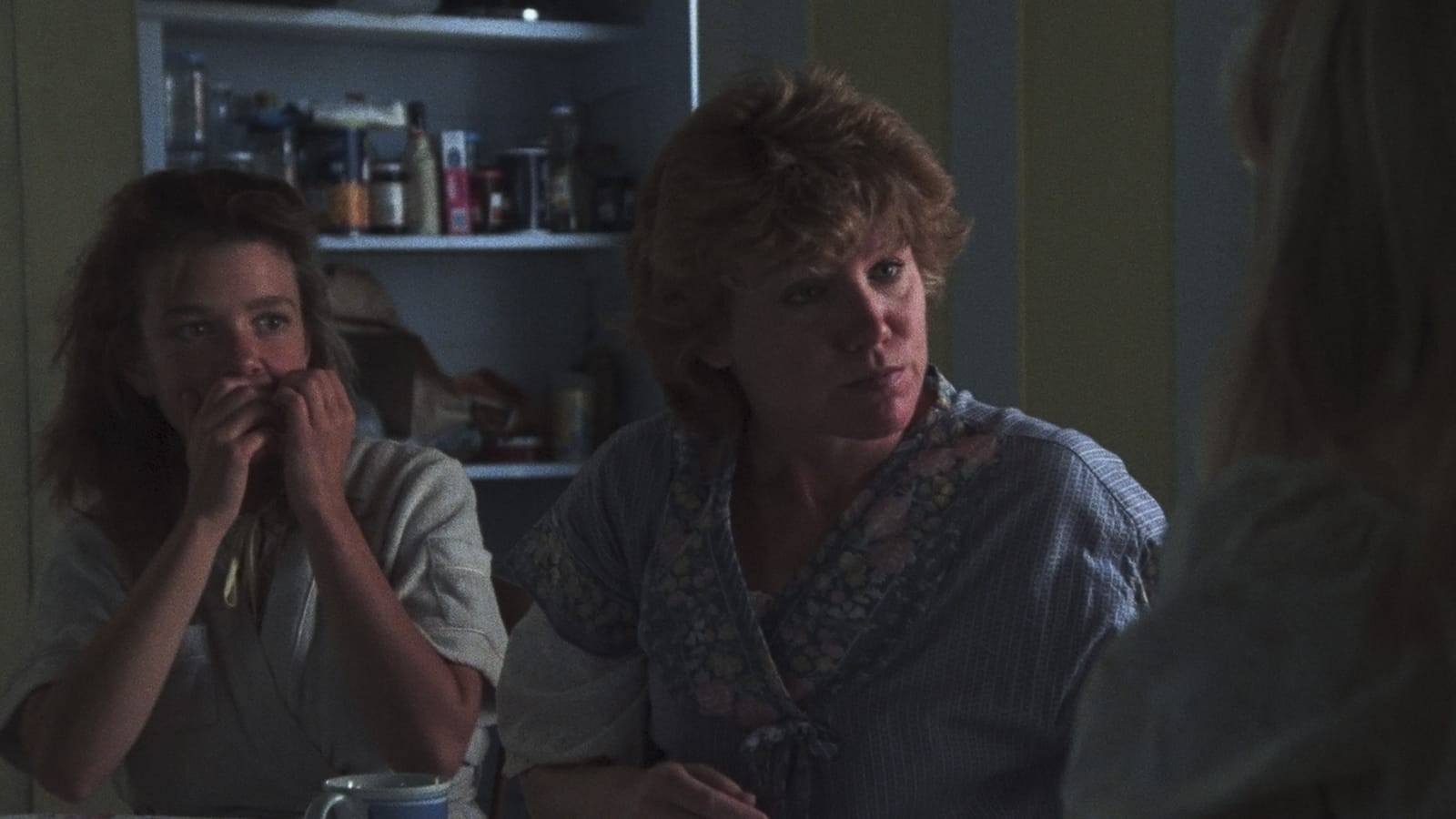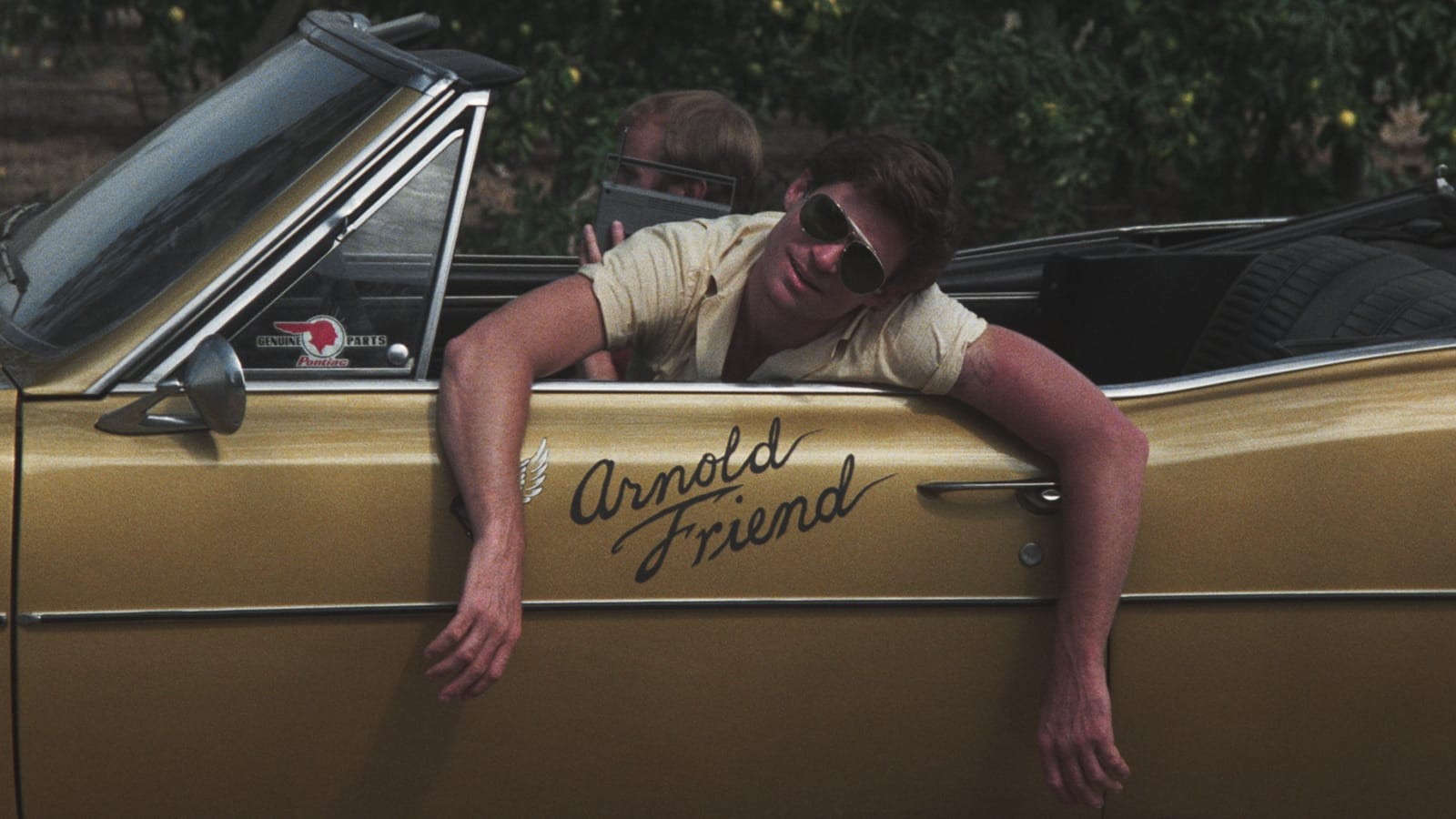 Michelle Orange
Michelle Orange
In Joyce Chopra’s 1985 feature, Laura Dern makes a treacherous passage from girlhood.

Treat Williams as Arnold Friend and Laura Dern as Connie Wyatt in Smooth Talk. Image courtesy Janus Films.
Smooth Talk, directed by Joyce Chopra, available to watch via Film at Lincoln Center’s Virtual Cinema
• • •
Joyce Carol Oates has cited two sources of inspiration for “Where Are You Going, Where Have You Been?,” her 1966 short story, adapted by Joyce Chopra for her feature directing debut Smooth Talk (1985), in which a pretty, mom-loathing fifteen-year-old named Connie is talked out of her home—and, it would appear, her life—by a stranger known as Arnold Friend. The first involves the so-called Pied Piper of Tucson, Charles Schmid, a twentysomething drifter who beguiled a group of local teens, murdering three of them—all girls—between 1964 and 1965. The second is “It’s All Over Now, Baby Blue,” Bob Dylan’s ballad of sea change and pitiless enjoinders to abandon a world that has abandoned you, to “strike another match, go start anew.” Both Schmid and Dylan epitomized a self-styled charisma particular to the era, one whose potency fascinated Oates, and seemed to have something to do with the chasm just then opening between parents and their kids.
Connie is girlish in the way that makes that word hurt: hyper-social and insanely self-conscious, with a “breathless, amused voice that made everything she said sound a little forced, whether it was sincere or not.” Connie likes the mall, the movies, and the drive-in restaurant. Music is her most reliable source of pleasure. Though she’s interested in attention and her nascent powers to draw it, when a boy invites Connie to sit in his car, it’s not his company that fills her “with the pure pleasure of being alive,” but a taste of something like freedom. It’s in this state that she notices herself being noticed by an odd, finger-waggling man. “Gonna get you, baby,” he tells her, in a moment Connie fails to register as portentous.

Laura Dern as Connie Wyatt and Treat Williams as Arnold Friend in Smooth Talk. Image courtesy Janus Films.
The story takes an equal interest in its two main characters and their midcentury vernacular. Oates’s fine, razor-cut sentences only occasionally graze Connie’s psychology; she depicts Arnold Friend as almost wholly phenomenal, a strutting, babbling caricature of death come for his blonde maiden. Much about Friend is familiar to Connie, though: his speech, his smile, the way he wears his jeans. She is both appalled and exhilarated by his appearance on the afternoon she is left at home alone, and not all that surprised.
In many ways faithful to its source material, Smooth Talk makes notable departures from Oates’s allegorical, much-anthologized story. Previously a documentary filmmaker largely focused on the experience of women and girls—Joyce at 34 (1972) documents the birth of the director’s first child, a girl—Chopra deploys a loose, naturalized aesthetic that liberates Connie (Laura Dern in her first leading role) from archetype, and the story from its stark design. Adapting the script with her husband, playwright Tom Cole, Chopra drew out the relationship between Connie and her mother (Mary Kay Place), emphasizing its role in the mixture of uncertainty and preening bravado with which Connie navigates her passage out of girlhood and into whatever it is that comes next.

Sarah Inglis as Jill, Margaret Welsh as Laura, and Laura Dern as Connie Wyatt in Smooth Talk. Image courtesy Janus Films.
Transplanting the characters from the sixties to a deeply eighties milieu, Smooth Talk is a study of that passage’s treachery. The movie’s first hour alternates between portraits of Connie at home, where she is harassed by the mother who sees only “a bunch of trashy daydreams” in her daughter’s eyes, and out in the world, where she can put into effect the various attitudes rehearsed in her bathroom mirror. Tall and wide-shouldered, Connie looks older than her two best girlfriends (Margaret Welsh and Sarah Inglis) but isn’t; we watch her clown and strike poses in public, where her tendency to slide between gawky kid and young siren is less pronounced. Changing into lipstick and bangles before a dude-trolling rampage through the mall, Connie and her equally inexperienced friends treat not just gender but desire as hypothetical, a form of play, something it’s possible to talk and act yourself into. Her body is required for these experiments, but the extent and meaning of its involvement remain hazy.

Elizabeth Berridge as June Wyatt and Mary Kay Place as Katherine Wyatt in Smooth Talk. Image courtesy Janus Films.
For a while it’s unclear how much Connie has in common with the prowling, miserably chaste girl Doris Lessing describes in The Golden Notebook (1962), whose long hours “inwardly fashioning” the agent of her deliverance from sexual obsession eventually result in an image “strong enough to create the man.” Connie wants to learn to drive, to dance in peace, escape her family and their falling-down house. The second time she agrees to sit in a boy’s car, she is quickly overwhelmed: “Stop,” she tells him. “I’m not used to feeling this excited.” Mostly, it turns out, she wants someone to be nice to her, to restore the tenderness newly withdrawn by her mother and nerdy older sister (Elizabeth Berridge), who regard this precarious stage of Connie’s development with barbed dismay. A sense of mutual betrayal jams their relations. Nostalgia for the recent past infuses Connie’s fondness for James Taylor’s gentle, plodding 1977 remake of the 1959 hit “Handy Man”; the god of empty promises, James Dean, gazes out from her walls.

Treat Williams as Arnold Friend in Smooth Talk. Image courtesy Janus Films.
By the time Friend (Treat Williams) slow-rolls his Pontiac convertible down Connie’s gravel driveway, where she is home alone after refusing to join a family barbeque, the long setup has primed the viewer, horror movie–style, for something terrible to happen. What else comes to girls like this—prideful, oblivious, determined to play a game rigged in their disfavor? Chopra’s deliberate pacing and long, beautifully composed shots culminate in the protracted standoff between Connie and Friend, whose aging-greaser eccentricity Williams embodies as a nightmare of madness and masculine entitlement. Dern’s long career as one of cinema’s great reactors was born in this nearly thirty-minute scene, in which her entire being flickers between coquettish intrigue, dark apprehension, and terror. We learn as she does the limits of her imagination, how little Connie’s wishes and even her fears have to do with the likes of Arnold Friend.

Laura Dern as Connie Wyatt in Smooth Talk. Image courtesy Janus Films.
In a recent conversation between Oates, Chopra, and Dern to mark the movie’s inclusion in the Revivals program of the New York Film Festival, Chopra discussed her decision to alter Oates’s ending: where the story’s final lines suggest Connie’s surrender to oblivion, in Smooth Talk she survives, returning home from her drive with Friend—which mostly takes place off-screen—intact but altered. The gap presents the viewer with a sort of reverse Rorschach test: what you see in what is not shown is in some ways the point, as is the fact that your response may be subject to change. In a 1990 interview, Dern expressed amazement at the assumption that Connie is raped, having maintained the belief that Friend only takes Connie for a ride—a view she seemed to recant in another interview last year. Though Oates and Chopra scoffed at the idea of Arnold Friend as metaphor, or a kind of mirage, they stopped short of naming Connie’s ordeal as a sexual assault. Connie herself seems unsure of what took place, appearing dazed in the final scenes of familial rapprochement.
I first watched Smooth Talk as a girl younger than Connie, at the behest of a cinephile father seeking to impart crucial information I could only pretend to grasp. Returning to it recently, I found myself no less confused—to both gratified and frustrated effect. With its unlikely note of resolution, the coda in particular belies the adaptation’s larger insistence on nuance, ambiguity, what even a young girl knows, without knowing, to be irresolvable. Chopra’s vision of Connie redeemed attempts to reenter the broad, poetic register of her story’s source. For me, anyway, this time, that door was closed.
Michelle Orange is the author of This Is Running for Your Life: Essays and the forthcoming nonfiction book Pure Flame (2021).